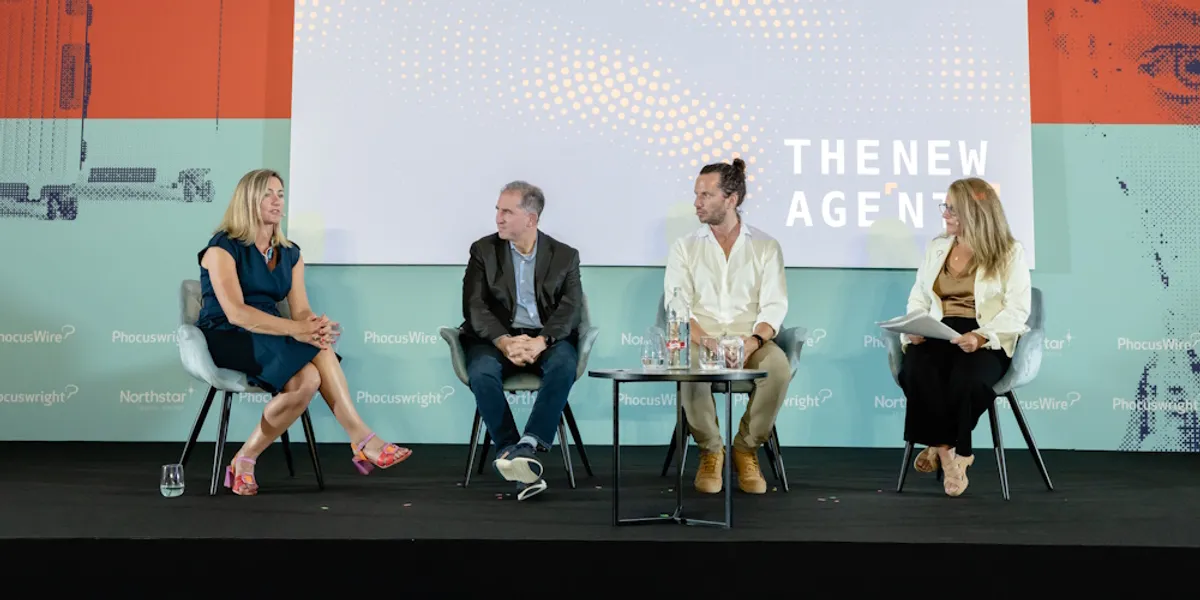
The ongoing transformation of corporate travel—What’s next?
How did your country report this? Share your view in the comments.
Diverging Reports Breakdown
The ongoing transformation of corporate travel—What’s next?
The global corporate travel sector was valued at $1.4 billion last year. A panel at Phocuswright Europe 2025 discussed how technology, sustainability and geopolitical uncertainty will affect the industry. The conversation also covered the rise of agentic artificial intelligence, which Jean-Christophe Taunay-Bucalo, president and chief operating officer of TravelPerk, said is imminent for the front-end. The panelists also delved further into sustainability expectations as well as technology’s role in making effective travel decisions.Watch the full discussion, moderated by Phocus Wright director of research Alicia Schmid, below.
According to Jenny Sabineu, senior manager of travel (Europe, the Middle East and Africa and Latin America) and sustainability at Salesforce, companies’ hybrid work model is “driving more selective travel.”
Sabineu said that it’s now more “purpose driven,” with employees being more selective about when they travel and the duration.
Charlie Sultan, president of Concur Travel at SAP Concur, also commented on the remote and hybrid models, noting that people still understand the importance of seeing one another face to face.
“There’s a lot of us here who want to be here in person, who want to be able to see each other to speak to each other, and a lot of those things just can’t happen that natural over Zoom or Teams or whatever the technology is that people are using,” he said at the conference.
“I think people recognize that you can nurture existing relationships for a certain time period without having to see the people face to face, but if you’re establishing new relationships, if it’s been a while since you’ve seen people, business travelers need to get out, and they want to get out.”
The conversation also covered the rise of agentic artificial intelligence, which Jean-Christophe Taunay-Bucalo, president and chief operating officer of TravelPerk, said is imminent for the front-end, with travelers typing out a prompt as opposed to applying filters during search.
According to Taunay-Bucalo, there will be a transition phase, with some travelers quickly acclimating to an AI approach and others preferring to stick to what they know. But companies will need to consider how AI will come into play in the backend as well.
“There [are] two layers of AI, the front-end one, that’s going to happen no matter what, and then how do you use it in the backend so that all the processes are faster, better and smoother?”
The panelists also delved further into sustainability expectations as well as technology’s role in making effective travel decisions.
Watch the full discussion, moderated by Phocuswright director of research Alicia Schmid, below.
The ongoing transformation of corporate travel—What’s next?
The global corporate travel sector was valued at $1.4 billion last year. A panel at Phocuswright Europe 2025 discussed how technology, sustainability and geopolitical uncertainty will affect the industry. The conversation also covered the rise of agentic artificial intelligence, which Jean-Christophe Taunay-Bucalo, president and chief operating officer of TravelPerk, said is imminent for the front-end. The panelists also delved further into sustainability expectations as well as technology’s role in making effective travel decisions.Watch the full discussion, moderated by Phocus Wright director of research Alicia Schmid, below.
According to Jenny Sabineu, senior manager of travel (Europe, the Middle East and Africa and Latin America) and sustainability at Salesforce, companies’ hybrid work model is “driving more selective travel.”
Sabineu said that it’s now more “purpose driven,” with employees being more selective about when they travel and the duration.
Charlie Sultan, president of Concur Travel at SAP Concur, also commented on the remote and hybrid models, noting that people still understand the importance of seeing one another face to face.
“There’s a lot of us here who want to be here in person, who want to be able to see each other to speak to each other, and a lot of those things just can’t happen that natural over Zoom or Teams or whatever the technology is that people are using,” he said at the conference.
“I think people recognize that you can nurture existing relationships for a certain time period without having to see the people face to face, but if you’re establishing new relationships, if it’s been a while since you’ve seen people, business travelers need to get out, and they want to get out.”
The conversation also covered the rise of agentic artificial intelligence, which Jean-Christophe Taunay-Bucalo, president and chief operating officer of TravelPerk, said is imminent for the front-end, with travelers typing out a prompt as opposed to applying filters during search.
According to Taunay-Bucalo, there will be a transition phase, with some travelers quickly acclimating to an AI approach and others preferring to stick to what they know. But companies will need to consider how AI will come into play in the backend as well.
“There [are] two layers of AI, the front-end one, that’s going to happen no matter what, and then how do you use it in the backend so that all the processes are faster, better and smoother?”
The panelists also delved further into sustainability expectations as well as technology’s role in making effective travel decisions.
Watch the full discussion, moderated by Phocuswright director of research Alicia Schmid, below.
Source: https://www.phocuswire.com/Online/global-corporate-travel-phocuswright-europe-2025/60485
